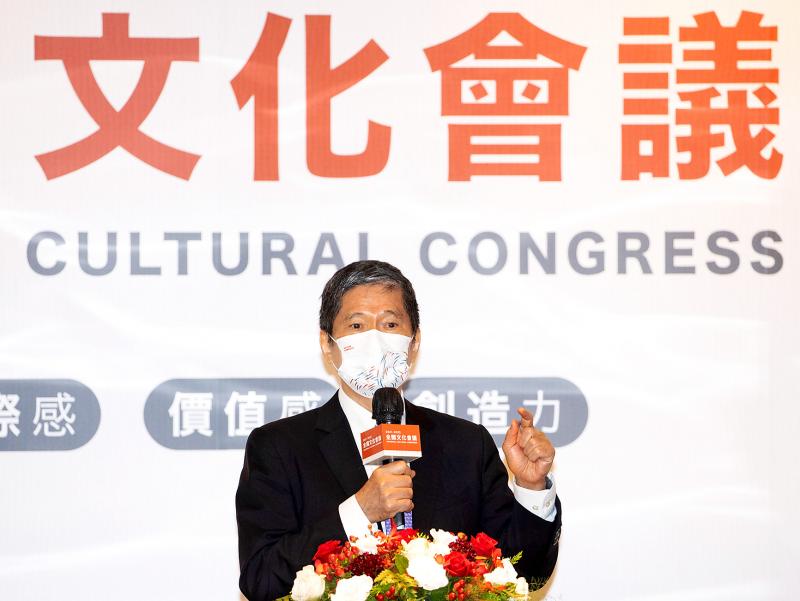The Ministry of Culture is to reform the nation’s cultural content industry to protect “cultural sovereignty” from the threat of digital streaming, Minister of Culture Lee Yung-te (李永得) said on Sunday.
Lee’s remarks were published in a ministry statement released after the conclusion of the National Culture Congress, held on Saturday and Sunday.
This year’s event consisted of six symposiums with professionals and experts working in culture and arts.

Photo: CNA
Amid the rapid growth of digital content and streaming, young people have an abundance of information readily available from around the world, and the government must help develop the Taiwanese content industry to protect the nation’s cultural sovereignty, the ministry said.
The ministry is seeking to consolidate the nation’s resources and continue to work with experts to find solutions to preserve cultural sovereignty, it said.
Sunday’s talks covered four main topics: visual arts, performing arts, digital cultural communications and the application of technology to culture, it said.
The congress, which is usually held every four years, was for the first time delayed for a year, after last year’s event was pushed back due to the COVID-19 pandemic.
Lee said the event was fruitful, adding that he learned a lot from speaking with people who work in cultural preservation and promotion.
The congress is intended to collect opinions from a wide range of sectors and map out national cultural development.
This year’s congress yielded 122 suggestions that Lee described as “culture policies” the ministry would either consider or carry out after internal discussions.
The ministry spent almost an entire year mapping out the topics for this year’s symposiums, and collecting opinions from the public and professionals working in cultural sectors, Lee said.
While Taiwanese are proud of the nation’s rich cultural foundation, Taiwan’s cultural production capability has been insufficient, resulting in policies often implemented with unclear goals, he said.
To address the long-unresolved problem, changes must be made to budgets for programs and in how the nation thinks about culture, he said.
Cultivating talented people dedicated to the development of the nation’s cultural content industry would also help tackle the problem, he added.
Information about the congress, such as discussions, are to be posted on the event’s Web site (https://nccwp.moc.gov.tw).
Suggestions and ideas about the topics addressed at the congress can also be submitted on the site, the ministry said.

A strong continental cold air mass is to bring pollutants to Taiwan from tomorrow, the Ministry of Environment said today, as it issued an “orange” air quality alert for most of the country. All of Taiwan except for Hualien and Taitung counties is to be under an “orange” air quality alert tomorrow, indicating air quality that is unhealthy for sensitive groups. In China, areas from Shandong to Shanghai have been enveloped in haze since Saturday, the ministry said in a news release. Yesterday, hourly concentrations of PM2.5 in these areas ranged from 65 to 160 micrograms per cubic meter (mg/m³), and pollutants were

Taiwan’s armed forces have established response protocols for a wide range of sudden contingencies, including the “Wan Chun Plan” to protect the head of state, the Ministry of Defense (MND) said today. After US President Donald Trump on Saturday launched a series of airstrikes in Venezuela and kidnapped Venezuelan President Nicolas Maduro, concerns have been raised as to whether China would launch a similar “decapitation strike” on Taiwan. The armed forces regularly coordinate with relevant agencies and practice drills to ensure preparedness for a wide range of scenarios, Vice Minister of National Defense Hsu Szu-chien (徐斯儉) told reporters before a

EVA Airways on Saturday said that it had suspended a pilot and opened an investigation after he allegedly lost his temper and punched the first officer several times as their plane was taxiing before takeoff at Los Angeles International Airport. According to a report published on Thursday by The Reporter, the incident occurred after the flight’s Malaysian first officer tried to warn the Taiwanese pilot, surnamed Wen (文), that he was taxiing faster than the speed limit of 30 knots (55.6kph). After alerting the pilot several times without response, the first officer manually applied the brakes in accordance with standard operating

NOT AN OPENING: Trump’s violation of international law does not affect China’s consideration in attacking Taiwan; Beijing lacks capability, not precedent, an official said Taiwanese officials see the US’ capture of the president of Venezuela as a powerful deterrent to Beijing’s aggression and a timely reminder of the US’ ability to defeat militaries equipped with Chinese-made weapons. The strikes that toppled Venezuelan President Nicolas Maduro signaled to authoritarian leaders, including Chinese President Xi Jinping (習近平), US President Donald Trump’s willingness to use military might for international affairs core to US interests, one senior official in Taipei’s security circle said. That reassured Taiwan, the person said. Taipei has also dismissed the idea that Trump’s apparent violation of international law could embolden Beijing, said the official, who was not